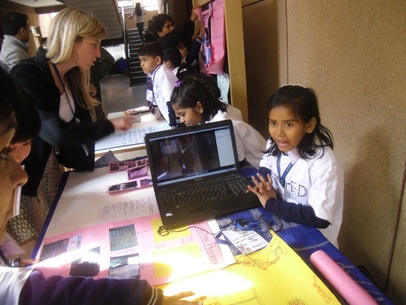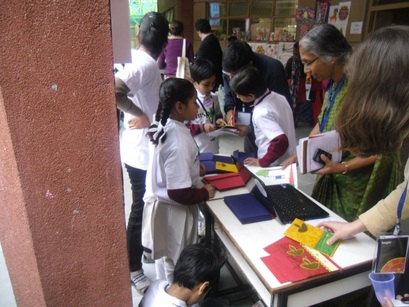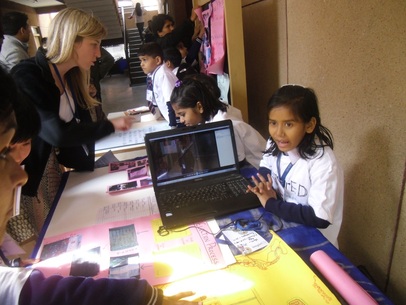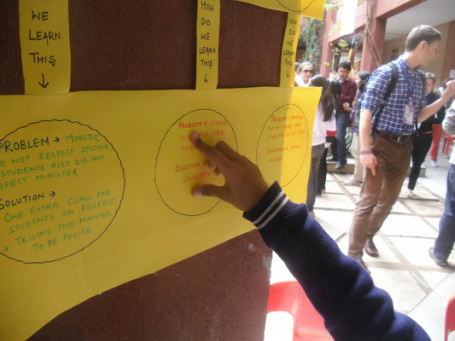Edex at InspirEd – How much can our students achieve?

The Deputy Prime Minister was one of around fifty students participating in EdEx, a showcase of school projects run by second year Teach For India fellows. As part of their fellowship, they choose a project designed “to tackle one primary challenge to students’ achievement… and create innovative and sustainable solutions to this problem;” according to the best description I could find online. It should be community-focussed, but go beyond academics. Here are three great projects I saw:
A group of children who have been taught the theory and practice of debating: “You should propose a motion to us” they began “or we can take one from this box.” I proposed something suitably controversial, like stricter punishments in schools and they leapt into action immediately:
“I agree that this is necessary because…”
“I disagree with you, because…” six students went at it, hammer and tongs, responding to each others’ points articulately and thoughtfully for several minutes, until I broke in, with difficulty, to thank them. A moderator would have been helpful, but the debating was spot on!
I never got to to ask the deputy prime minister about her defeat – but I did get to see the students who had formed a parliamentary system in their class- with responsibilities for sports, the library and behaviour. Elections had been held to give the groups different roles – and they had even written down what they had learned from the whole experience – shown left, mid-explanation.
My host fellow, Shivendu, had helped his students form Ek Khwaab – a company hand-making cards, which they sold at sixty ruppees apiece. The class was divided up, with a general manager, production manager, and a range of responsibilities, with cards created by teams of four. Their first tranche of money had funded a play area; they were now aiming to create a school library.The kicker – not really a kicker since you’ve seen the photo at the top – all of these students were III or IV Standard – that is, aged between eight and ten – but all the diverse range of projects were based on an ethos of student ownership and responsibility. Clearly, much effort had gone into setting up the organisations and projects – but the results were organisations, companies and cooperatives which were now independent. Students were demonstrating confidence, articulacy and self-efficacy, in English, which most had been learning for less than two years, and in the face of a range of visitors. I shall stop hammering at this point – except to say, these are sustainable changes, which alter children’s life chances considerably.
I should apologise at this point – I’m usually fairly meticulous in noting the names of those I speak with and using them – and on this occasion I totally failed to do so – being involved in open conversations and not thinking I would write about any of it…
Also, I’ve looked for examples of more developed write-ups of community projects on the internet and haven’t found anything very detailed written about them. If anyone from TFI has any good examples, please pass them on.
What might Teach First learn from Teach for India?

A lot, but let’s focus on the community projects. I’m trying here to develop a personal issue into broader point for social justice education in the UK.
At ‘Returners’ of Summer Institute (after my first year teaching), we were placed in a large hall in Canterbury and told about Big Hairy Audacious Goals- setting outrageously ambitious goals and then following through on them. (I believe this came from Teach For America). We were to be the first year of this new programme, with a ‘Leadership Development Officer’ in support. I came up with ambitious goals for one of my classes – a Year 8 group I had taught the previous year and wanted to inspire to love history, teach independent learning and collaboration.
A couple of months later I sat with my LDO as she explained to me that this was a lovely goal and a great idea, but actually my goals had to be either:
– progression of at least one national curriculum level in one year
– something similar for GCSE groups
– raising literacy by 1.5 years within a year.
(A few days after InspirED, I listened to Wendy Kopp speak insightfully and powerfully about the point where big goals got subsumed into ‘one and a half year’s progress in a year’ at Teach For America – such that she visited a class where the tenth graders, reading at sixth grade level, had targets of one and a half year’s progress – despite the utter failure of such a target to prepare them for their impending exams. This fits into the argument somewhere here).
I made a series of arguments to my LDO – based around the idea that pursuing national curriculum levels would be putting the cart before the horse – unlikely to inspire anyone, easily pursued by teaching to the test, but irrelevant in the broader scheme of things. No one had ever asked for Key Stage 3 levels anywhere outside my school and Teach First – they were ‘meaningless’, the lead History AST in the borough said to me at the time.
I won’t rehearse all the arguments here – perhaps in another post – but the point I’d like to make is – where’s the audacity in any of these numbers? Where’s the passion? Instead of inspiring me, the whole thing turned me off, so I spent a while debating with my LDO, and in the end she decided (or, presumably, got permission) to leave me alone. Her input was wasted on me and I was probably far less ambitious than I should, or could, have been that year – because the targets fitted the organisation’s goals – but didn’t inspire me whatsoever.
In stark contrast to TFI, no one ever asked me or inspired me to do anything successful outside the classroom in the school I spent four years teaching in. Not from Teach First, nor from the school itself – nor my friends, for that matter. I’m not blaming anyone – if it was that important, I should have done something myself. Nor do I regret the time I spent on my main occupations after school (apart from planning and marking): coursework support/revision classes, helping students write university applications, and spending time talking to my students.
I appreciate the importance of grades and quantifiable, short-term results. Levels and particularly GCSE grades are the telos of our education system – and failure, as a teacher, head of department, headteacher, or, now, governing body, sets you up for the chop.
I also understand why schools and system have been put under this pressure – how much grades matter to individuals’ life chances. Having spent two years with responsibility for students’ university applications, I know how much of a limitation a lack of work in Year 10 could end up being for a student. I wouldn’t argue now, as I did four years ago, that: “enjoyment, rather than attainment is more at the core of achievement and aspiration in later life;” I’d see them in a more balanced way.
On the other hand I would ask whether Teach First are overlooking something important here? TF seek to build aspiration, access and attainment, with attainment ‘at the core’, as my LDO put it; Teach for India pursue these ‘three As’ and values. Could Teach First get more aspiration, access and attainment through similar extra-curricular (or, really co-curricular) projects? Could such opportunities do more to build the values which set students up for success in later life. Moreover, should TF be doing something to redress this almost exclusive focus on grades, which sometimes seems to exclude the ‘education of the whole child’?
This may seem to have travelled quite a long way from the premise of the argument, so in terms of a specific conclusion: should TF participants be encouraged, or expected, to run a community project, modelled on that of Teach For India, in their second year?
Caveats and limitations to this argument:
1) One TFI Programme Manager told me that not all of the projects are as successful as those I saw. This seems unsurprising – I don’t have hold of any hard data either way.
2) TFI fellows teach elementary school classes – goals are hairier when you have one group of twenty-five students, not eight or nine groups for a couple of hours each a week.
3) TFI sometimes makes me think Britain is weak on data – they track academic progress very heavily (they do this as well).
4) I don’t mean to imply that TF teachers haven’t set up amazing organisations – I’d say they are a) the exception and b) more likely to be doing so after their two years are over – and it could be normalised before then.
5) I heard a fair bit from people who were aware of, and excited by, forthcoming changes to TF’s leadership development programme, which I think included some work on broader impact – but it was all second-hand; I also heard something about how its being implemented piecemeal. (Nor am I trying to pretend that such a change is easy).
6) Finally, as I have said above – but just in case – I’m not arguing that we shouldn’t pursue good grades for our students. I’m just arguing that we should be doing much more than this – and perhaps the balance has go.
In late 2009, I wrote this to my LDO:
“If we send our students out as self-confident, mature young adults, who are used to working individually and in groups, to discovering and communicating well, and with a good ethical compass, this is what will really allow them to achieve. People can recover their life chances if they flop in their GCSEs, they can’t recover them if they leave with zero motivation and very poor social relations with others.”
Could, or should, Teach First be doing more to make this broader sense of education a reality?
[Originally posted 18th March, 2013]
Comments
In the first year at TFI- some of us obsessed about every thing that our kids had or did not have access to. This meant that we did everything that our children needed- setting up libraries, conducting teacher trainings, creating student material and so forth. There was no organizational mandate ever. We were only asked in the second year to do a CDP- but a lot of us had already taken up several projects on our own. Point is- it is largely up to an individual to do whatever they want for their kids, communities, schools or anything else they might choose. Like the PM said- not all CDPs work out- similarly an organization can do very little about the things that are not done.
Reply
Maybe we don’t think in the same way because many of these things exist, to varying degrees of quality, in most British schools already.
I agree that is up to teachers what they do – but I think they can go further if they have a structure offering them support and challenge – rather than simply relying on teachers’ initiative.
One of the things the TF teachers I spoke to were excited about was that teachers would move through the new leadership development programme at a pace that suited them – some would be reaching broad, community impact within their first year, others might stay focussed on the classroom throughout the programme. Perhaps this would answer some of your concerns…
Reply
Hi Harry,
Great to catch up with you in India. I had some similar thoughts to you but I think your appraisal of the LDO role is a bit out of date.
I see my role as helping my participants to articulate an ambitious vision that reflects their purpose for being in the classroom. This means it is a broad holistic vision of what a child should leave their classroom with. Many of my visions explicitly name mindset, passion for the subject and interactive skills in their visions and this therefore becomes the focus of most of my work with the Teach First participants. While achievement is still probably prioritised, I get the impression that the role has changed vastly in the last few years. This year we are trialling ways of measuring students’ wellbeing and mindset among other things. Happy to speak to you more about this.
Community Projects – I was also inspired by the projects I saw and understand that the new Teach First Leadership Development Programme focuses much more on teachers evidencing their own impact and providing opportunities to do this, which certainly seems like a good step to me. Apparently the second year of TF used to be dominated by a school project but many partner schools thought this was happening at the expense of their teaching. I guess one of the big differences is that Teach for India pay their teachers whereas our schools pay our teachers – which means that any community project would have to be something that our schools would see as being in their own interest.
Reply
Hi Ben,
Thanks for your comment and good to hear from you. I wouldn’t pretend that my experience (2009) is representative of the LDO role now – the changes you describe sound pretty encouraging – and this is not something I’ve kept pace with particularly. I more wanted to hang together the broader impact I saw being prioritised in India with the more short-term focus on grades that pervades British education.
You are right to highlight the problems – as does FV for the TFI projects. Clearly none of us are near a solution yet…
Reply
Hey Ben,
I just want to clarify that I don’t think that pay issue makes a big difference in the Teach For India context. My sense is that the community project, first of all, is not really permitted to distract teachers from their core work of teaching. As Harry points out, TFI is very good at tracking academic progress and this does not change in the second year when the “Be the Change” project is done. My sense is that the project is meant to help Fellows make a meaningful transition from their second year to life after the program as Ambassadors. The project helps them ensure that their impact continues well beyond the classroom, and helps them put into practice the kind of systematic, multi-stakeholder work they need to take on as Ambassadors in order to take on the daunting challenge of reform in a nation of over a billion people.
Personally, I think this would have been an interesting thing for me to take on as a Teach For America teacher. We were more focused on getting the community to support the classroom, but I think these projects can also use the classroom to support the community. This might have helped me think about my initial years as an Ambassador in a more impact-orientated way.
Hope that’s helpful!
jen

